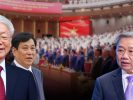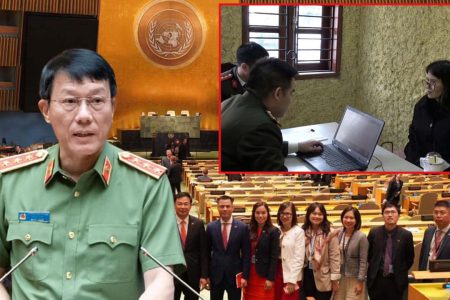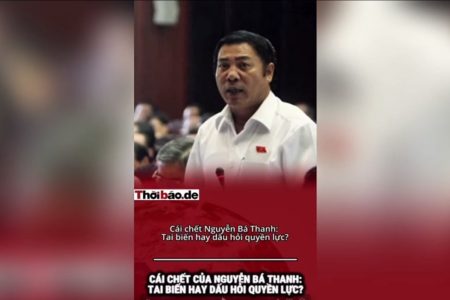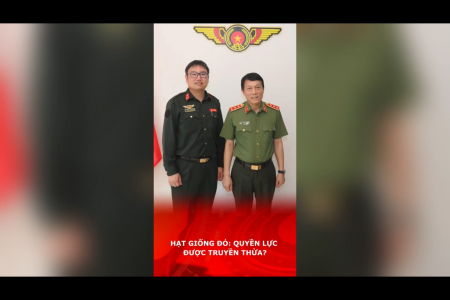
The January 12 Reuters newsletter by author James Pearson titled „Hot news from the Super Cup- How Vietnam skirts Party speculation ban on social media”
According to author James Pearson, netizens are using dodging when writing about issues that the Vietnamese Communist Party (CPV) lists as „top secret.“
He gave an example of a post on the Facebook page of a well-known account holder, Le Nguyen Huong Tra, which he borrowed her title as the title of this article. Specifically, the article „Hot news from the Super League!“ posted on Huong Tra’s personal page on January 9, without a word mentioning the names of the CPV leaders in the next term. Instead, account holder Le Nguyen Huong Tra only mentioned „Dong Anh Team„, „Quang Nam Team„, „Hanoi # 1 Player„, „Quang Binh Women’s Team„, „Lien Doan“ football for the 2021-2025 term,” etc.
Account owner Huong Tra commented: “Opportunities for southern teams are over and recruiting vulnerable women; The game is only left for Dong Anh-Quang Nam-Thanh Hoa-Nghe Tinh”!
Author Pearson said that this is a creative way for netizens to break the information membrane blocked by the government. Accordingly, Facebookers likened the party to General Secretary and President Nguyen Phu Trong, who came from Dong Anh district, Hanoi, as Dong Anh Team; Prime Minister Nguyen Xuan Phuc’s faction, who is from Quang Nam, is Team Quang Nam.
On November 3, Mr. Phuc signed Decision 1722 / QD-TTg on the promulgation of the list of State secrets. Accordingly, the plan for personnel of the Politburo member who is the General Secretary, the President of the State, the Prime Minister, the Chairperson of the National Assembly, and the Standing Committee of the Secretariat that has not been publicized, is classified as „top secret.“
Freelance journalist Anton Tuan, reporter of Chan Hung TV, said that Facebookers must find ways to avoid direct naming while discussing and revealing true news or rumors about party personnel there are two reasons:
“They don’t say it directly, for example, who is Dong Anh or who is Quang Nam? They would like to use allusions.
No one dares to claim that it is correct. Assuming there is a leak, people would not dare say it is true, so people will never say exactly. They must all hint at that. Vietnamese people know the trick of talking. For example, saying that when it comes to taking pictures like this and that, of course, it affects them, dangerous them, they have to insinuate it. That is normal. Out on the sidewalk, if the news leaked, then we could say it directly and put it on the Internet, so it could be said.
Blogger Nguyen Vu Binh, who previously wrote for the Communist Magazine, commented that Prime Minister Nguyen Xuan Phuc’s decision did not limit the heated debate about leadership arrangements at the 13th Congress scheduled to take place from January 25 to February 2. He said this is a writing style, a way of speaking for a long time:
„Following the Facebooker that wrote from before the text to after the text, I don’t see any difference in writing style. In my opinion, it is not because there is a new document on the top secret of the internal Communist Party, but this is the way of the Facebookers they wrote before, how to write like that …. And there is also the aspect of disregarding the Party’s arrangement of choices.”
Another person who likened groups to power struggles like soccer teams was Facebooker Bui Van Thuan, who called himself „Old father from an ethnic minority” but may also be understood as “The Father of the Nation“ on Facebook. Recently he reported something like this:
„Team Lai Da Dong Anh still refuses to leave the field despite age, illness, and the rules of the flock.
Team Quang Nom does not want to retire too, also demanded to stay as a special case like anyone else.
The team of Ben Tre coconut will go home“
Radio Free Asia asked why he chose to write like that, he replied via text message:
“There are 3 reasons for choosing that writing.
1. Avoid heavy politics, write gentle humor that will make it easier for those who are new to reading and learning about Vietnamese politics. Second, the Vietnamese „crazy“ of football, writing that way will attract readers and boldly exchange, discuss and even laugh at political „teams.“
2. Also avoid being accused of violating “confidential” regulation regarding the party’s leadership. Writing the style of football: “team,” “player,” “boss” etc. will delight readers and make them feel safe. Another reason is the metaphorical meaning: Politics in Vietnam is just a game of entertainment and is football, but for teams, referees, organizers … all the word “one mother.” It is a football game in which the same are in two positions player and referee.
3. The third reason is, writing like that is also a way to avoid FB censorship. (I have many articles not being seen in Vietnam). There are several Facebook accounts in Vietnam (including mine) when writing, discussing, commenting on the politics of the country in general, about the internal fighting between the fractions them the regime will ask Facebook to delete or hide their posts.“
Mr. Thuan shared that it was his program „news press clipping and discussion“ written on Facebook from 2016 to now that caused him to quit his job in mid-2017. He was previously a chemistry teacher at high school.
He said that Facebookers now „have to fight on two fronts: against the Vietnamese dictatorial regime in Vietnam and a technology dictator of Facebook.“
He continued: “The worrying thing is: Because of the profit in business, Facebook is increasingly inclined to obey, obey non-democratic requirements, even help the Vietnamese government censor and silence local critics and dissidents. We are alone against the two dictatorships, and those two are showing clear signs of shaking hands with each other. This is also the reason that many people choose to write like that.”
Facebook and other giants like Google were recently denounced by Amnesty International for being complicit with the Vietnamese government, helping the government censor content on social networks.
The Reuters reporter questioned the Vietnamese Ministry of Foreign Affairs whether posts like Facebooker Bui Van Thuan or Le Nguyen Huong Tra would violate the government’s „top secret“ decision, but it has not been determined.
Thoibao.de (Translated)


























